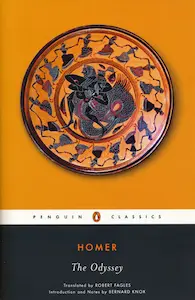The Odyssey - Summary
Homer

Introduction
“The Odyssey” by Homer is an epic poem that narrates the ten-year journey of the Greek hero Odysseus as he returns home from the Trojan War. This timeless tale explores the themes of heroism, the power of the gods, and the importance of perseverance. Through its vivid storytelling and memorable characters, “The Odyssey” captivates readers with its rich mythology and timeless lessons. In this book summary, we will delve into the key elements of the epic, highlighting its major events, characters, and themes.
The Journey Begins: Odysseus and the Trojan War
The epic opens with Odysseus, the king of Ithaca, still trapped on the island of Ogygia by the nymph Calypso. Meanwhile, his wife Penelope and son Telemachus face numerous challenges in Ithaca, as suitors attempt to take Odysseus’ place. The gods, particularly Athena, play a significant role in guiding Odysseus and his family throughout the story.
The Call to Adventure: Odysseus’ Trials and Tribulations
Odysseus finally sets sail from Ogygia, but his journey home is far from smooth. He encounters various mythical creatures and faces numerous trials along the way. One such encounter is with the Cyclops Polyphemus, whom Odysseus blinds to escape his clutches. This event showcases Odysseus’ cunning and resourcefulness.
The Temptations: Circe, the Sirens, and Calypso
Throughout his journey, Odysseus faces temptations that threaten to derail his return home. Circe, a sorceress, turns some of his men into pigs, but with the help of Hermes, Odysseus resists her enchantments and eventually frees his crew. The Sirens also try to lure Odysseus with their enchanting songs, but he cleverly has his men tie him to the mast, allowing him to resist their allure.
The Underworld: Meeting Heroes and Seeking Wisdom
In his quest to return home, Odysseus ventures into the realm of the dead, seeking guidance from the blind prophet Tiresias. Here, he encounters various deceased heroes and learns about the challenges that await him. This journey to the Underworld adds depth to the narrative, as Odysseus gains insights and prepares for the trials ahead.
The Return: Odysseus Reclaims His Kingdom
After facing countless challenges, Odysseus finally returns to Ithaca disguised as a beggar. With the help of his son Telemachus and a loyal swineherd named Eumaeus, he devises a plan to defeat the suitors and reclaim his kingdom. With his exceptional archery skills, Odysseus proves his identity and eliminates the suitors, restoring order to Ithaca.
Themes Explored: Heroism, Fate, and Hospitality
“The Odyssey” explores several enduring themes, resonating with readers across centuries. Heroism is a central theme, as Odysseus demonstrates bravery, intelligence, and resilience in his journey. The poem also delves into the concept of fate, as the gods shape Odysseus’ destiny and test his character. Additionally, the importance of hospitality is emphasized throughout the narrative, with both positive and negative examples illustrating its significance in ancient Greek society.
The Characters: Odysseus, Penelope, and the Gods
“The Odyssey” introduces readers to a diverse cast of characters. Odysseus, the protagonist, embodies the qualities of a true hero, but he is also flawed, making him relatable and complex. Penelope, his wife, showcases loyalty and strength as she awaits his return. The gods, including Athena, Poseidon, and Zeus, play pivotal roles in shaping the story, often intervening in mortal affairs.
The Influence: “The Odyssey” in Literature and Beyond
Homer’s “The Odyssey” has had a profound influence on literature and storytelling. Its themes and characters have been reimagined and referenced countless times in various works, from James Joyce’s “Ulysses” to Margaret Atwood’s “The Penelopiad.” The epic’s enduring popularity is a testament to its timeless appeal and the universal themes it explores.
Conclusion: The Odyssey’s Lasting Legacy
In conclusion, “The Odyssey” by Homer remains a masterpiece of ancient Greek literature, captivating readers with its epic tale of Odysseus’ journey home. Through its exploration of heroism, fate, and hospitality, the poem offers valuable insights into the human condition. Homer’s vivid storytelling and memorable characters continue to inspire and resonate with audiences, ensuring “The Odyssey” remains a beloved and influential work for generations to come.